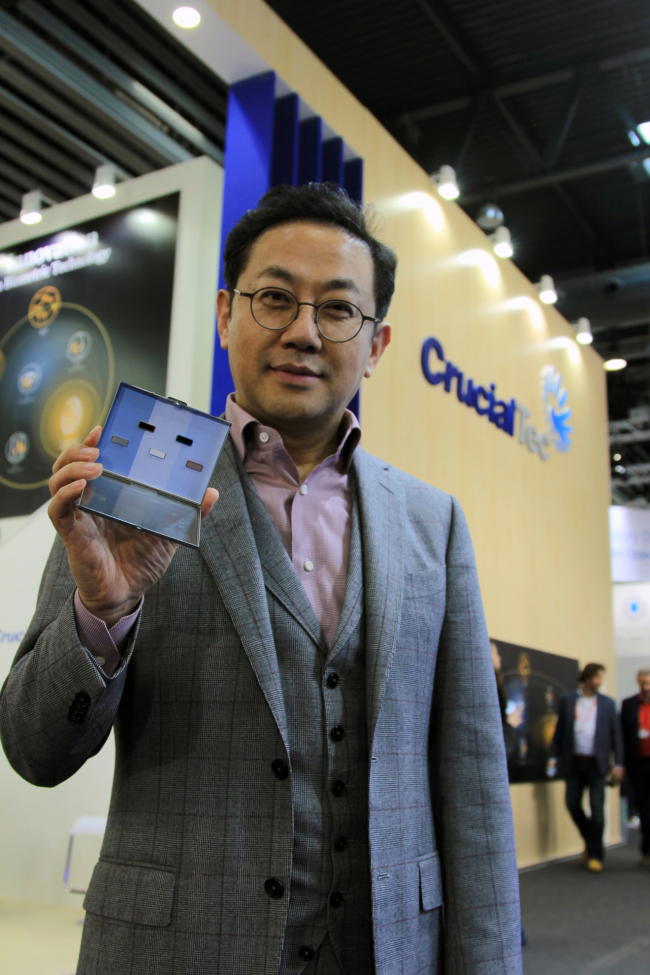BARCELONA, Spain ― CrucialTec, one of the world’s leading fingerprint sensor makers, is attracting attention at the Mobile World Congress in Barcelona, Spain, the world’s largest mobile and communications trade show.
“Since there are few biometric module makers competent enough to integrate solutions, hardware and packaging technology into fingerprint modules, many device-makers and some fingerprint sensor suppliers visit the company’s booth to discuss business collaboration,” CrucialTec CEO Charles Ahn told The Korea Herald.
Firms who visited the Korean firm’s booth included Chinese smartphone-makers Huawei, Xiaomi and BBK.
 |
CrucialTec CEO Charles Ahn poses with fingerprint modules at the MWC on Monday. |
One flagship product the firm displayed at the event was a fingerprint scanner embedded under Gorilla glass, the first of its kind in the world.
“The fingerprint reader coated with Gorilla glass is much cheaper than one with sapphire glass, but it boasts a similar strength,” said the CEO, adding that smartphone-makers would benefit from the technology since they would be able to reduce costs with it.
Gorilla glass is thought to be about one-tenth the cost of sapphire glass, which is widely used in high-end smartphones including Apple’s iPhones and Samsung’s Galaxy smartphones.
A display embedded with a fingerprint sensor, which allows mobile users to authenticate their fingerprint on the bottom of the display, also caught the eyes of enterprise customers.
He expected that more smartphone makers at home and abroad would deploy fingerprint readers in their flagship products as the fintech industry, which requires a high level of security measures, is on the rise.
Albeit a business-to-business firm, CrucialTec also showcased products to appeal to general consumers, such as a mobile payment solution, a heart rate monitoring sensor and a smart thermometer.
CrucialTec has joined hands with Danal, a leading online payment solution firm, to develop BioPay, which will help mobile users to do financial transactions in a secure manner by incorporating a fingerprint scanner into the payment system.
“Unlike Apple’s Apple Pay and Samsung’s Samsung Pay, which only allow mobile payments with their own devices, BioPay will be compatible with all devices equipped with fingerprint scanners,” Ahn said.
Some products that caught visitors’ eyes were proximity sensors that support heart rate monitoring.
A proximity sensor, mostly located on the top of a smartphone near the front camera, detects the presence of nearby objects without direct contact.
“The proximity sensor combined with a heart rate monitoring system can bring much change to smartphone design since it gets rid of the necessity of a separate heart monitoring sensor usually placed on the back of a smartphone,” he said.
By Kim Young-won, Korea Herald correspondent
(
wone0102@heraldcorp.com)




![[Weekender] Korea's traditional sauce culture gains global recognition](http://res.heraldm.com/phpwas/restmb_idxmake.php?idx=644&simg=/content/image/2024/11/21/20241121050153_0.jpg)



